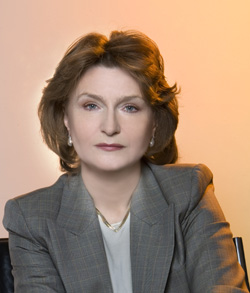WikiMANNia hat in 352 Tagen seinen 18. Geburtstag.. Geburtstag.
|
Natalia Narochnitskaya
| Наталия Алексеевна Нарочницкая | |
|---|---|
| Geboren | 23. Dezember 1948 |
| Beruf | Politiker |
| URL | narochnitskaia.ru |
Natalia Narochnitskaya (* 1948) ist eine russische Historikerin, Politikerin und Diplomatin.
Ihre Ausbildung erhielt sie am Moskauer Staatlichen Institut für Internationale Beziehungen[wp]. Von 1982 bis 1989 arbeitete sie als sowjetische Diplomatin bei der UNO in New York. 2003 wurde sie als Abgeordnete der Partei Rodina[wp] in die russische Staatsduma[wp] gewählt. Im Jahr 2008 übernahm sie die Leitung der Pariser Filiale des neu gegründeten Institut de la Démocratie et de la Coopération (Institut für Demokratie und Zusammenarbeit).[1]
Natalia Narochnitskaya arbeitete von 1982 bis 1989 im Generalsekretariat der Vereinten Nationen[wp], war in der russischen Parlamentsdelegation des Europarates und, von 2003 bis 2007, Abgeordnete in der Duma und Vize-Präsidentin des Auswärtigen Ausschusses der Duma. Die Historikerin hat zahlreiche Bücher veröffentlicht (unter anderem das Standard-Werk: Russland und die Russen in der Weltgeschichte) und gehört zu den gefragten Kommentatoren in den russischen Medien. Sie ist Präsidentin der Stiftung für Historischen Ausblick in Moskau und des Institut de la Démocratie et de la Coopération (Institut für Demokratie und Zusammenarbeit) in Paris.[2]
Natalia Narochnitskaya (* 1948) is a Russian historian and widely known public figure.
A frequent commentator in the Russian mass media on international affairs, Natalia Narochnitskaya was a member of the State Duma of the Russian Federation from 2003 to 2007, where she represented the Rodina (Motherland) Party. She was Vice-Chairman of the Dumas Foreign Affairs Committee; Chairman of the Committee for the Study of the Practice and Implementation of Human Rights and Civil Liberties; and a member of the Russian delegation to the Parliamentary Assembly of the Council of Europe. From 1982 to 1989 she worked at the Secretariat-General of the United Nations in New York.
She is president of the Foundation for Historical Outlook in Moscow. This prominent think-tank publishes an on-line newspaper, www.stoletie.ru and a scholarly journal, "Links". She has a doctorate in history and is a graduate of the State Institute of International Relations in Moscow. For many years she worked at the Institute of World Economics and International Relations in the Russian Academy of Sciences.
The daughter of an academician, Natalia Narochnitskaya is herself the author of numerous works on history and the role of historical memory in contemporary politics, as well as the author of hundreds of articles in the Russian press. Her major work, "Russia and Russians in World History", has gone into six editions. She specialises in diplomatic history, international law, the history of international relations, and the philosophy of Western liberalism. Her books have been translated into French (Que reste-t-il de notre victoire? Paris: Editions des Syrtes, 2008), Czech and Serbian.
Natalia Narochnitskaya is active in the Russian Orthodox Church[wp] and is known for her strong defence both of Russian national interests and also of good relations between Russia and Europe. She speaks English, German, French and Spanish.[3]
Einzelnachweise
- ↑ Wikipedia: Natalija Alexejewna Narotschnizkaja
- ↑ COMPACT-Konferenz: Kurzinfos zu den Referenten 2012
- ↑ IDC: The Institute of Democracy and Cooperation
Netzverweise
- Wikipedia führt einen Artikel über Natalija Alexejewna Narotschnizkaja
| Dieser Artikel basiert für einen Teil auf dem Artikel The Institute of Democracy and Cooperation. |
